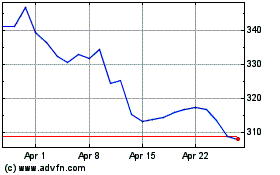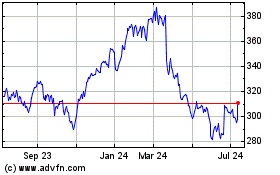How Companies Are Dealing with Employee Burnout During the Pandemic
November 18 2020 - 8:11PM
Dow Jones News
By WSJ Noted.
As the pandemic continues, many remote employees are reporting
feelings of depression and anxiety. To respond to this need,
companies are adapting policies and rushing to roll out benefits to
head off a surge of employee distress.
KEY TAKEAWAYS
1. Managers are being asked to respond more compassionately to
employee needs.
Some companies are encouraging managers to call their direct
reports on an ongoing basis and check on their well-being. Jimmy
Etheredge, CEO of North America at consulting firm Accenture PLC,
recently asked his 27 direct reports to attend 2 1/2 hours of
virtual training on how to better support colleagues facing
mental-health issues.
2. Many companies are expanding access to counseling and mental
health services.
Some employers have rolled out digital counseling apps or
brought on coordinators to help employees access care during the
pandemic. One employee at the ticketing company Eventbrite began
leading "recognizing burnout" sessions for other employees, giving
colleagues a space to voice their feelings, and to hear advice from
mental health professionals about how to cope.
3. Employers are finding creative ways to help boost morale and
encourage employees to take time off.
Seattle construction and engineering company McKinstry Co. LLC
began issuing companywide "good news Friday" memos, pointing out,
"Hey, here's eight things that happened this week that are pretty
good," says Dean Allen, the company's CEO. Some companies encourage
managers and teams to allow Zoom calls from parks or other outdoor
venues, while others are experimenting with allowing employees to
work fewer hours a week, with a small pay cut. Additionally, some
companies are offering employees bonus "self-care days" off to
encourage them to disconnect from their laptops.
4. Leaders are finding new ways to help employees communicate
the struggles they're facing.
Some companies have adopted techniques to help employees signal
how they're doing. At Dell Technologies Inc., Jennifer "JJ" Davis,
senior vice president of corporate affairs, says her team has
developed a way to alert colleagues when they are "above the line"
-- feeling OK, and able to handle the work load -- or "below the
line" and needing assistance. The phrases allow people to convey
their state of mind without necessarily divulging personal details.
Ms. Davis says she also helps her colleagues cope by being honest
about her own challenges. If she needs to start dinner during a
meeting that's running long, she'll tell them so, and let them know
she's multi-tasking so they feel comfortable doing the same.
Read the original article by Chip Cutter here.
(END) Dow Jones Newswires
November 18, 2020 19:56 ET (00:56 GMT)
Copyright (c) 2020 Dow Jones & Company, Inc.
Accenture (NYSE:ACN)
Historical Stock Chart
From Mar 2024 to Apr 2024

Accenture (NYSE:ACN)
Historical Stock Chart
From Apr 2023 to Apr 2024
